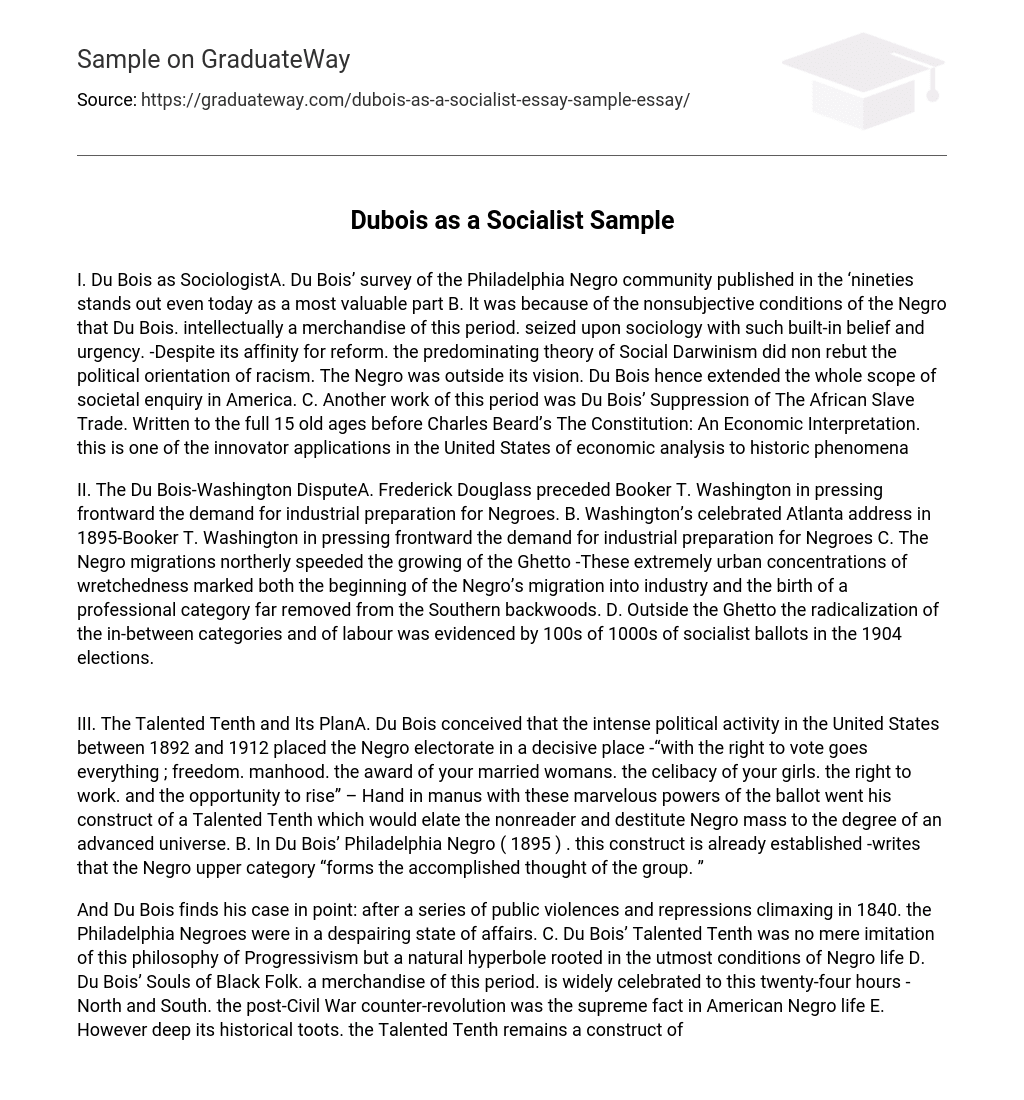I. Du Bois as SociologistA. Du Bois’ survey of the Philadelphia Negro community published in the ‘nineties stands out even today as a most valuable part B. It was because of the nonsubjective conditions of the Negro that Du Bois. intellectually a merchandise of this period. seized upon sociology with such built-in belief and urgency. -Despite its affinity for reform. the predominating theory of Social Darwinism did non rebut the political orientation of racism. The Negro was outside its vision. Du Bois hence extended the whole scope of societal enquiry in America. C. Another work of this period was Du Bois’ Suppression of The African Slave Trade. Written to the full 15 old ages before Charles Beard’s The Constitution: An Economic Interpretation. this is one of the innovator applications in the United States of economic analysis to historic phenomena
II. The Du Bois-Washington DisputeA. Frederick Douglass preceded Booker T. Washington in pressing frontward the demand for industrial preparation for Negroes. B. Washington’s celebrated Atlanta address in 1895-Booker T. Washington in pressing frontward the demand for industrial preparation for Negroes C. The Negro migrations northerly speeded the growing of the Ghetto -These extremely urban concentrations of wretchedness marked both the beginning of the Negro’s migration into industry and the birth of a professional category far removed from the Southern backwoods. D. Outside the Ghetto the radicalization of the in-between categories and of labour was evidenced by 100s of 1000s of socialist ballots in the 1904 elections.
III. The Talented Tenth and Its PlanA. Du Bois conceived that the intense political activity in the United States between 1892 and 1912 placed the Negro electorate in a decisive place -“with the right to vote goes everything ; freedom. manhood. the award of your married womans. the celibacy of your girls. the right to work. and the opportunity to rise” – Hand in manus with these marvelous powers of the ballot went his construct of a Talented Tenth which would elate the nonreader and destitute Negro mass to the degree of an advanced universe. B. In Du Bois’ Philadelphia Negro ( 1895 ) . this construct is already established -writes that the Negro upper category “forms the accomplished thought of the group. ”
And Du Bois finds his case in point: after a series of public violences and repressions climaxing in 1840. the Philadelphia Negroes were in a despairing state of affairs. C. Du Bois’ Talented Tenth was no mere imitation of this philosophy of Progressivism but a natural hyperbole rooted in the utmost conditions of Negro life D. Du Bois’ Souls of Black Folk. a merchandise of this period. is widely celebrated to this twenty-four hours -North and South. the post-Civil War counter-revolution was the supreme fact in American Negro life E. However deep its historical toots. the Talented Tenth remains a construct of restricting. restraining and subordinating the Negro multitudes
F. The Talented Tenth did non function to let go of and steer these new energies. it fettered them ; it substituted solidarity with broad reformism for the specifically new forces and independent activities of the Negro multitudes
IV. Early Old ages of the NAACPA. Du Bois. the lone Negro in the NAACP leadingB. Abolitionists had attempted to rule the Negroes within their ranks. this was possible in single instances. non with the mass-The white Abolitionists. consciously or otherwise. were forced to establish themselves upon the rebellious and fleeting slavesC. The Talented Tenth was dominated because it was isolated from the negro massD. The patrons of the NAACP had limited their programs chiefly to legal action and enlisting the large names of liberalismE. Du Bois. about wholly on his ain. emphasized the demand for a Negro magazine-The Crisis proved to be a great success. making over a 100 thousand circulation in less than ten old ages





